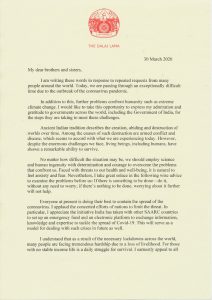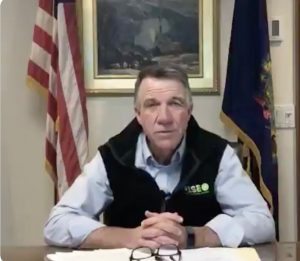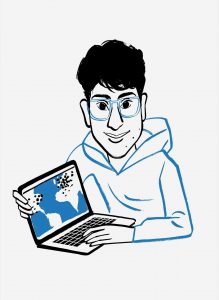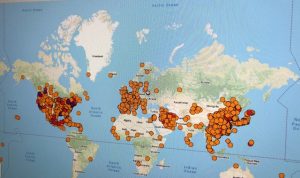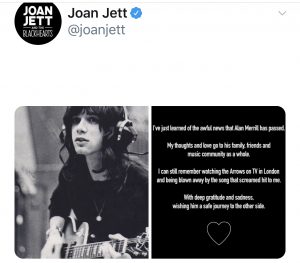“You have to learn to deal with yourself.”
March 30, 2020
Solitary Confinement Advise for Life with Covid in the Free World
‘People have been asking me questions ever since this “shelter in place,” with people having to stay home. It’s somewhat similar I suppose to being in solitary confinement, even though you might be with family and whatnot.
Being in solitary confinement is really just being thrown upon yourself: You’re running around, just like people do in your regular life, and now all of a sudden you’re confronted with yourself, and find that in a lot of cases you haven’t really put anything into yourself to occupy yourself.
Everything is outward directed. That’s what happened to me 27 years ago, and what happens to a lot of guys who are initially thrown into this situation—it’s like being thrown into the ocean. You have to learn how to swim. You have to learn how to deal with yourself.
I’ve watched quite a few people fall apart, lose their minds. But I went in another direction. So 27 years later I’m still sound in mind and body and spirit. I attribute that to just reading and cultivating myself. That’s the thing, when you’re thrown upon yourself, you realize you are more equipped than you realized. A lot of the system keeps us from realizing our own power. It’s a good opportunity for people to tap into that.
Being in solitary confinement, it’s a punishment. But people out in society, it’s an opportunity for your kids to get more in tune with themselves. Because when you’re in school, especially with the internet being what it is, everybody is generally being pulled away from themselves.
The root word of education is “to educe,” to bring forth that which is already there. Education isn’t really about what kind of career you’re gonna get or how you’re gonna make money. That’s not why we were born, to make money for somebody else. To get a big house. To have a nice car. You’re here to bring forth that which is already there. Hopefully young people being forced to stay home outside of the mainstream curriculum are able to get a glimpse of themselves and start pulling on that thread.’
From His Holiness the Dalai Lama
My dear brothers and sisters,
I am writing these words in response to repeated requests from many people around the world. Today, we are passing through an exceptionally difficult time due to the outbreak of the coronavirus pandemic.
In addition to this, further problems confront humanity such as extreme climate change. I would like to take this opportunity to express my admiration and gratitude to governments across the world, including the Government of India, for the steps they are taking to meet these challenges.
Ancient Indian tradition describes the creation, abiding and destruction of worlds over time. Among the causes of such destruction are armed conflict and disease, which seems to accord with what we are experiencing today. However, despite the enormous challenges we face, living beings, including humans, have shown a remarkable ability to survive.
No matter how difficult the situation may be, we should employ science and human ingenuity with determination and courage to overcome the problems that confront us. Faced with threats to our health and well-being, it is natural to feel anxiety and fear. Nevertheless, I take great solace in the following wise advice to examine the problems before us: If there is something to be done—do it, without any need to worry; if there’s nothing to be done, worrying about it further will not help.
Everyone at present is doing their best to contain the spread of the coronavirus. I applaud the concerted efforts of nations to limit the threat. In particular, I appreciate the initiative India has taken with other SAARC countries to set up an emergency fund and an electronic platform to exchange information, knowledge and expertise to tackle the spread of Covid-19. This will serve as a model for dealing with such crises in future as well.
I understand that as a result of the necessary lockdowns across the world, many people are facing tremendous hardship due to a loss of livelihood. For those with no stable income life is a daily struggle for survival. I earnestly appeal to all concerned to do everything possible to care for the vulnerable members of our communities.
I offer special gratitude to the medical staff—doctors, nurses and other support personnel—who are working on the frontline to save lives at great personal risk. Their service is indeed compassion in action.
With heartfelt feelings of concern for my brothers and sisters around the world who are passing through these difficult times, I pray for an early end to this pandemic so that your peace and happiness may soon be restored.
With my prayers,
Dalai Lama
Local Journalism
‘Like many in business, trusted news organizations are being hit hard by this pandemic. If you can, please consider subscribing to your local paper or contributing to a VT news organization. You deserve transparency and the truth, and they work hard to keep you informed.
-Vermont Governor Phil Scott
NYTimes
Ben Smith
“Abandon most for-profit local newspapers, whose business model no longer works, and move as fast as possible to a national network of nimble new online newsrooms. That way, we can rescue the only thing worth saving… the journalists.”
Bail Out Journalists. Let Newspaper Chains Die.
The coronavirus is likely to hasten the end of advertising-driven media, our columnist writes. And government should not rescue it.
“There’s all this ‘doom and gloom for local journalism stories’ that have happened in the last week or so, and I hope that other people see what we’re doing and understand that the important thing is the journalism — it’s the stories, it’s the investigations — that’s what matters,” Ken Ward said. He will also be on the staff of the nonprofit investigative powerhouse ProPublica and will have support from Report for America, another growing nonprofit organization that sends young reporters to newsrooms around the country.
The news business, like every business, is looking for all the help it can get in this crisis. Analysts believe that the new federal aid package will help for a time and that the industry has a strong case to make. State governments have deemed journalism an essential service to spread public health information. Reporters employed by everyone from the worthiest nonprofit group to the most cynical hedge fund-owned chain are risking their lives to get their readers solid facts on the pandemic, and are holding the government accountable for its failures. Virtually every news outlet reports that readership is at an all-time high. We all need to know, urgently, about where and how the coronavirus is affecting our cities and towns and neighborhoods.
So what comes next? That decision will be made in the next few months — by public officials, philanthropists, and other tech companies, and people like you.
The right decision is to consistently look to the future, which comes in a few forms. The most promising right now is Ms. Green’s dream of a big new network of nonprofit news organizations across the country on the model o The Texas Tribune, which Mr. Thornton co-founded. There are also a handful of local for-profit news outlets, like The Seattle Times, The Los Angeles Times and The Boston Globe, with rich and civic-minded owners, and The Philadelphia Inquirer, which is owned by the non-profit Lenfest Institute for Journalism. And there is a generation of small, independent membership or subscription sites and newsletters like Berkeleyside.
Elizabeth Green, a founder of Chalkbeat, a nonprofit news organization reporting on education issues, in Washington, D.C.
[Avi Schiffmann]
The High Schooler Who Became a COVID-19 Watchdog
The New Yorker
by Brent Crane
In December, DT said, “We have a problem that, a month ago, nobody thought about.” Well, somebody did. On December 29th, as DT vacationed with his family at Mar-a-Lago, Avi Schiffmann, a seventeen-year-old from Washington State, launched a homemade Web site to track the movement of the coronavirus. Since then, the site, ncov2019.live, has had more than a hundred million visitors. “I wanted to just make the data easily accessible, but I never thought it would end up being this big,” the high-school junior said last week over FaceTime. Schiffmann, gap-toothed and bespectacled, was sitting on his bed wearing a blue T-shirt and baggy pajama bottoms. It was late morning. He was at his mother’s house, on Mercer Island, outside Seattle.
Using a coding tactic known as “web-scraping,” Schiffmann’s site collates data from different sources around the globe—the W.H.O., the C.D.C., Yonhap News Agency in South Korea—and displays the latest number of covid-19 cases. It features simple graphics and easy-to-read tables divided by nation, continent, and state. Data automatically updates every minute. In a politicized pandemic, where rumor and panic run amok, the site has become a reputable, if unlikely, watchdog.
He began teaching himself to code when he was seven, mainly by watching YouTube videos, and has made more than thirty Web sites. “Programming is a great creative medium,” he said. “Instead of using a paintbrush or something, you can just type a bunch of funky words and make a coronavirus site.” One of his first projects, in elementary school, was what he calls “a stick-figure animation hub.” Later sites collated the scores for his county’s high-school sports games, aggregated news of global protests, and displayed the weather forecast on Mars. “His brain is constantly going from one thing to another, which is good, but I also try to focus him in,” his mother, Nathalie Acher, said. “I’m not techy at all myself. I see it as just really boring. He sees it as an art form.”
Schiffmann took the virus threat seriously before many others did. “I’ve been kind of concerned for a while, because I watched it spread very fast, and around the entire world. I mean, it just kind of went everywhere.” He took his own precautions. “I got masks a while ago. I got, like, fifteen for seventeen dollars. Now you can’t even buy a single mask for, like, less than forty.” His mother chimed in. “I wish I had listened to him,” she said. “But, in his teen-ager way, he’d come down the stairs with his eyes huge and be, like, ‘There are fifty thousand more cases!’ and I’d be, like, ‘Yeah, but they’re over there, not here.’ ”
Her son is a C student.
Now that the grownups of the world are finally, and appropriately, freaking out, it is hard for Schiffmann not to feel righteous vindication. “If you told someone three months ago that we should spend, like, ten billion dollars in upgrading the United States’ health care, they would have been, like, ‘Nah,’ ” he said. “Now, everyone’s, like, ‘Oh, my God, yes.’ But this is the kind of stuff we should have done a long time ago.”
Young people give me so much hope. ❥ -dayle
Keeping Connected and Compassionate
The USNS Comfort hospital ship enters New York to help relieve the load on coronavirus-stricken hospitals.
NATURE.COM
Seven tips to manage your mental health and well-being during the COVID-19 outbreak
This is unlikely to be the writer’s retreat that you have long dreamt of. The suggestion that periods of quarantine might bring unprecedented productivity implies we should raise the bar, rather than lower it. Do not underestimate the cognitive and emotional load that this pandemic brings, or the impact it will have on your productivity, at least in the short term. Difficulty concentrating, low motivation and a state of distraction are to be expected. Adaptation will take time. Go easy on yourself. As we settle into this new rhythm of remote work and isolation, we need to be realistic in the goals we set, both for ourselves and others in our charge.
Proactively manage your stress threshold
Try to lay a solid foundation for your mental health and well-being by prioritizing your sleep, and practise good sleep hygiene (for example, avoid blue lights before bed, and maintain a routine around your sleep and wake times). Eat well (be conscious that you might be inclined to lean on alcohol, or other indulgences, to manage stress — this is understandable, but potentially damaging in the long run). Exercise: it will lower your stress levels, help you to better regulate your emotions and improve your sleep.
Know your red flags
One way to manage moments of distress is to identify key thoughts or physical sensations that tend to contribute to your cycle of distress and feelings of being overwhelmed. Our thoughts (“Why can’t I concentrate?”), feelings (frustration, worry, sadness), physical sensations (tension, upset stomach, jitters) and actions (such as compulsively checking the latest COVID statistics) each feed into and amplify these negative emotional spirals. Addressing one aspect of this loop by, for example, actively reducing the physical symptoms (I use box breathing: breathe in for four counts, hold for four, breathe out for four and hold for four, then repeat) can de-escalate the cycle and help you regain control.
Routine is your friend
It helps to manage anxiety, and will help you to adapt more quickly to this current reality. Create clear distinctions between work and non-work time, ideally in both your physical workspace and your head space. Find something to do that is not work and is not virus-related that brings you joy. Working in short bursts with clear breaks will help to maintain your clarity of thought.
Be compassionate with yourself and with others
There is much that we cannot control right now, but how we talk to ourselves during these challenging times can either provide a powerful buffer to these difficult circumstances or amplify our distress. Moments of feeling overwhelmed often come with big thoughts, such as “I cannot do this,” or “This is too hard.” This pandemic will cause a lot of stress for many of us, and we cannot be our best selves all the time. But we can ask for help or reach out when help is asked of us.
Maintain connections
Even the most introverted of us need some sense of connection to others for our mental as well as our physical health. Many working groups have created virtual forums where you can contribute or just sit back and enjoy the chatter. Staff teams have instigated virtual coffee groups, online book clubs and co-working spaces where you can work in the (virtual) presence of others. We are in social isolation, but we need not feel alone. Reach out to those who might be particularly isolated.
Manage uncertainty by staying in the present
Take each day as it comes and focus on the things you can control. Mindfulness and meditation can be great tools.
This will probably be a stressful time for all of us, and will test the mental-health policies and practices of many research institutes, just as it is testing much else in the world. By embracing good mental-health and well-being measures, and by relying on others when necessary, we can protect ourselves and those around us.
By clinical psychologist Desiree Dickerson
https://www.nature.com/articles/d41586-020-00933-5
‘Put another dime in the jukebox, baby.’
‘Alan Merrill, who wrote the song “I Love Rock and Roll” that became a signature hit for fellow rocker Joan Jett, died Sunday in New York of complications from the coronavirus, his daughter said. He was 69.’ #COVID19US
?
